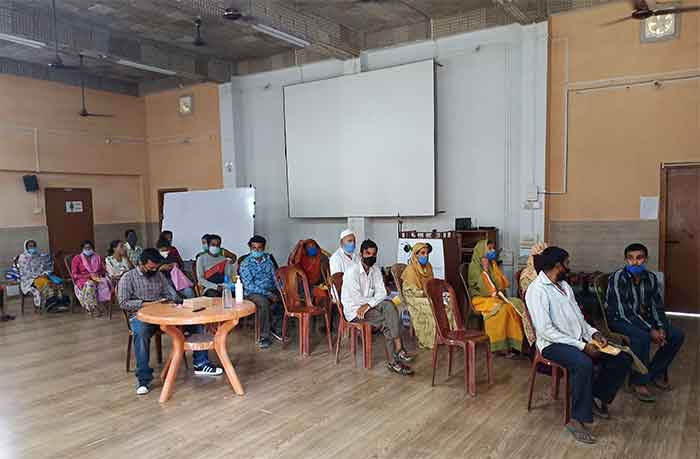
Guwahati: With lockdown restrictions lifting, 40-year-old Joydeep Das*, a vegetable vendor from Assam’s Chirang district, has reopened his stall. His wife Kalpana* is glad that things are returning to normal and, more importantly, that her husband is “stable”.
In 2005, Joydeep was abducted by a militant group in the neighbouring Kokrajhar district. His captors released him after a few hours of detention, but the trauma from the incident had left a deep impact. He was diagnosed with schizophrenia at a mental health camp in Panbari village last year and has been under treatment. But for years before that, he and his family were at the mercy of his psychological issues, without any means of treating or even recognising it for what it was.
Every month, hundreds of people like Joydeep in rural Chirang benefit from mental health camps being conducted by the NGO Action Northeast Trust (Ant). Even as the pandemic raged and the healthcare system was buckling, these camps — held at eight different locations across the district — continued to treat close to 1,300 patients with mild and severe mental disorders every month.
 Stationed in the remote Rowmari village in Chirang, Ant launched Mental Illness Treatment in Assam (MITA) in 2007 to bring mental healthcare to villages in the district, a strife-torn area that has witnessed bloodshed and violence due to Bodo militancy. The success of the ‘Chirang experiment’ has prompted NGOs and mental health practitioners from several other districts like Dibrugarh, Cachar, Udalguri, Goalpara, etc. to partner with Ant and emulate the MITA model in their own areas, most of which are either remote, flood-prone or conflict-ridden.
Stationed in the remote Rowmari village in Chirang, Ant launched Mental Illness Treatment in Assam (MITA) in 2007 to bring mental healthcare to villages in the district, a strife-torn area that has witnessed bloodshed and violence due to Bodo militancy. The success of the ‘Chirang experiment’ has prompted NGOs and mental health practitioners from several other districts like Dibrugarh, Cachar, Udalguri, Goalpara, etc. to partner with Ant and emulate the MITA model in their own areas, most of which are either remote, flood-prone or conflict-ridden.
A 2015 report, under the National Mental Health Programme, Assam, identified that approximately six per cent of the state’s 3.09 crore population suffered from neuro-psychological problems that require medical care. The cases were likely to increase to 15 per cent by 2020. And mental healthcare in rural areas is especially rife with complications.
Starting from scratch
“Most of the villages we work in Chirang district are remote places with a history of violence when the Bodo militancy was at its peak. Here villages don’t have proper roads, most people are poor and uneducated, and healthcare facilities are almost non-existent,” said Mintumoni Sarma, a physician part of the Ant team who has been working on mental healthcare in Chirang since 2013.
The Ant team faced several challenges when they first launched MITA in Chirang, said Pranami Garg, Executive Director. “It was definitely a Herculean task. There was a lot of fear, superstition and stigma attached to mental illness among the communities when we started back in 2007. Of course, nobody was ready to accept that mental illnesses existed. The general perception among the communities in villages is that if a person is suffering from mental illness, then he/she is possessed by ghosts and evil spirits. The patient is treated by local exorcists, called as ojha in Assamese,” she added.
They had to start by creating awareness at the village level, meeting local people in their homes, schools, offices and shops. The awareness campaigns focus on fundamentals of mental health, myths surrounding mental disorders, what are the signs of mental illnesses and why it is important to seek medical care.
“We took help from well-respected village men and even ojhas to convince people to come to our camps. Youngsters from the village also volunteer to organise the camps,” said Garg.
“Slowly, things are changing. Not only locals, but people from neighbouring districts are also regulars at our ongoing camps. Despite several hurdles, we have succeeded in winning the trust of the people in the past 14 years,” said Sarma.
“Once a patient recovers or shows signs of betterment, it encourages others to seek treatment at our camps. It is like a chain reaction,” said Ashok Kumar Nath, one of the founders of Sanathan Unnayan Sanstha, an NGO that is implementing the MITA programme in the Cachar district.
Recalling an incident of a teenage boy from Barpeta with bipolar disorder who was brought in chains by his family in 2015 to a mental health camp in Chirang, Sarma said that regular treatment helped in the patient’s recovery. “I am happy to say that he is leading a normal life now. He works and earns his livelihood. He is continuing with his treatment,” he added.
A typical day at camp
On June 20, in the nondescript Berabak Part One village in Assam’s Cachar district, 38-year-old Biswajit Dhar* was preparing to head to the mental health camp organised by Sanathan Unnayan Sanstha. Inside his tiny hut, made of bamboo walls and a tin roof, his family of four, including his wife and two young sons, had an early meal and dressed in their Sunday best in order to accompany him. Since May 2019, after Biswajit was diagnosed with bipolar disorder, the whole family has been attending the monthly camp regularly, without failure.
After a quick registration and payment of Rs 350, the Dhars sat in the waiting area along with several other patients and their family members. This amount varies but is never more than Rs 400 and includes doctors’ consultation, medicines and follow-up. Patients who can’t afford that are provided free consultation and medicines. No one is denied healthcare, said Nath.
Biswajit spent around 10 minutes with psychiatrist Rajib Dey, who was happy with Biswajit’s progress and asked him to continue coming to the camp. The family left after collecting the medicines. On average, the doctor sees each patient for 15-20 minutes; sometimes the consultation runs to 45 minutes for severe mental conditions. Out of the 90 patients who attended camp that day, 80 were regulars, including Bishnu Priya*, who is in her late 60s and travels around 20 kilometres from Silchar city every month to undergo treatment for mood disorders.
“Our patients are mostly villagers who come from across Cachar district. Some are also from Tripura and Mizoram and others are city folks like Bishnu Priya, who are economically weak,” said Nath. Before the pandemic, as many as 150 people would turn up.
If a patient is unable to visit the camp, then psychiatrists also visit their homes or speak to them over the phone. The team diligently follow up with regular patients who fail to turn up for camp. “On several occasions, the patient would suddenly stop visiting the camp even after showing the willingness to be treated,” said Sarma. “It could happen for various reasons like – the patient might have relapsed, they might have no family or financial support, or they have to travel far to reach the camp venue. Sometimes, they go missing or die too.”
Pandemic pains
To safeguard against coronavirus infection, camps follow sanitisation, thermal screening and mandatory wearing of masks. These days, the oxygen level of the patients are also checked.
Sarma said, “We can’t abandon the patients, no matter what. We conducted our camps during the lockdown in 2020 and this year too.”
The pandemic has, in fact, exacerbated the mental health situation, according to KN Kalita, associate professor of Lokopriya Gopinath Bordoloi Regional Institute of Mental Health (LGBRIMH), in Tezpur, Assam. “Our toll-free number has been ringing off the hook. We are getting a lot of calls from people seeking help from anxiety, depression and sleep disorders. Most of the calls are coronavirus-related — people are scared of contracting the virus or dying. Along with coronavirus came the lockdown, job loss and deaths in thousands. The stressful period has made children vulnerable to mental disorders,” he added.
Nath said the coronavirus has triggered a new set of mental health issues among the rural population. “Most of our new patients in the last several months have been direct or indirect victims of coronavirus. Either they have lost their livelihood or they or their family members have been infected by the coronavirus. People are anxious and depressed. They are suffering from anxiety and panic attacks. They want answers about life and death. They are not sure if they would survive the pandemic. Such is the general mood. Unfortunately, many rural folks don’t know how to articulate their feelings. They come to us saying they are feeling tired all the time. And that they have lost hope. Upon probing, we find that they are depressed and the reason is the coronavirus, ” he said.
Maitreyee Boruah is a Bengaluru-based freelance journalist and a member of 101Reporters.com, a pan-India network of grassroots reporters.
* (Names changed to protect identity)
 RSS Feed
RSS Feed















 August 4th, 2021
August 4th, 2021  Awake Goy
Awake Goy  Posted in
Posted in  Tags:
Tags: 













